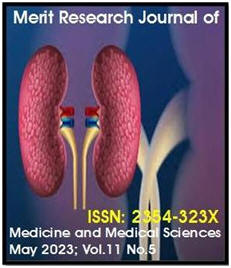
|
|
|
|
|
|
/ / MRJMMS Home / / About MRJMMS / / Submit Manuscripts / / Call For Articles / / Editorial Board / / Archive / / Author's Guide / /
|
Other viewing option
• Full text •Reprint (PDF) (177 KB)
Alburayk
AK
|
Original Research Article Acceptance of Mandatory Influenza Vaccination among Saudi Primary Care Physicians |
|||
|
Abdullah Khalid Alburayk1*, Faisal Eid Almutairi1, Khalid Faris Alotaibi1, Mohammed Ali Altokhais1, Basil Khalid Alsahabi2, Abdulaziz Khalid Alosaimi2, Abuobieda Abdalrouf3, Mostafa Kofi3 |
||||
|
1Family and Community
Medicine- Resident, Prince Sultan Military Medical City, Riyadh,
Saudi Arabia. |
||||
|
Abstract |
||||
|
Acceptance of
mandatory influenza vaccination requires an understanding of
knowledge, and attitudes (KA). This study explored the KA and
other co-variables influencing the acceptance of mandatory
influenza vaccination among Saudi physicians working in primary
care. A Cross-sectional study among Saudi physicians working at
Wazarat primary health care center in Riyadh was conducted from
Nov 2022 through Jan 2023. A convenience sample of 162
physicians was recruited and surveyed using a validated
questionnaire. A total of 138 responded and completed the study.
Univariate and multivariate analyses using SPSS version 22 were
performed to assess associations between sociodemographic
factors, KA, and acceptance of mandatory influenza vaccination.
The response rate was 85%. While the age of 92% of the
participants was < 36 years, 73.2% were males, and 34.1% were
smokers. Only 67.4% of the participants accepted mandatory
vaccination. Youngers, females, singles, postgraduates, and
staff with no chronic disease had higher odds to accept the
mandatory flu vaccine. On univariate analysis, physicians with
better knowledge and good attitudes were more likely to accept
the mandatory flu vaccination. On multivariate analysis,
physicians with higher knowledge and attitude scores were more
likely to accept the mandatory vaccination (adjusted odds ratio
(aOR): 1.17; (95%CI 1.05, 1.31)). Acceptance of mandatory
vaccination was negatively correlated with a declination of flu
vaccination (r=-0.237, P=0.005) and positively with actual
vaccination (r= 0.203, P=0.017). High levels ofgood attitudes
towards and knowledge of influenza vaccination were associated
with a high level of acceptance of mandatory flu vaccination.
This study paves the way for more targeted initiatives including
risk communication approaches to be implemented to improve
acceptance of mandatory influenza vaccination rates. |
Merit Research Journals© 2023 || Advertisement | Privacy policy.
